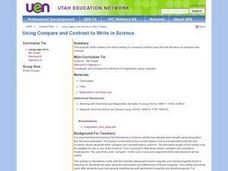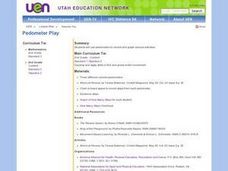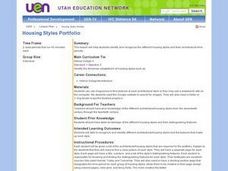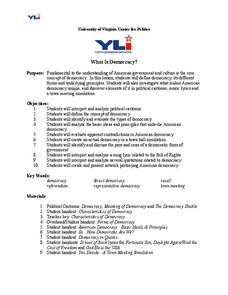Curated OER
Justice in America
Eleventh graders analyze primary sources for evidence of intent and purpose. In this American government lesson, 11th graders compose a one-page response explaining their understanding of "justice." Students read and examine quotes about...
Curated OER
Alas, All Human
Students define a scientist. In this ethics and science instructional activity, students read Asimov's Alas, All Human and write responses and discuss the possibilities of imperfection within science by scientists. Students discuss what...
Curated OER
How do we write a report?
Students write a report on a word processing program. In this report lesson, students write about what qualities a hero possesses. They type it on a word processing program and proofread for spelling, grammar, punctuation and more.
Curated OER
BUS: Farming: It's A Fact (Ag)
Students create two different types of graphs from the information in the "Farm Facts" booklet (i.e., bar graph, pie chart, etc.). They calculate where your food dollars are spent (on and off farm).
Curated OER
Lemon Light
Learners engage in a lesson which model different types of light refraction. They perform an experiment which uses lasers, jello and wax paper to illustrate how light refracts.
Curated OER
Opening A Bank Account
High schoolers identify the different types of accounts offered by local banks. Students review and define appropriate banking terms when opening an account. Working in pairs, high schoolers role play the proper way to open an account....
Curated OER
Early Colonial Labor Force: Indentured Servants and Slaves
Students study the labor force used during Colonial America. In this Colonial America lesson, students discuss labor types used in the colonies. Students read about indentured servants and the use of African slaves. Students use the...
Curated OER
Becoming Bilingual
Students explore the opportunities for bilingual workers. In this bilingual skills lesson, students select a foreign language to research and list ways their languages can be used in a work setting. Students explore career opportunities...
Curated OER
Using Compare and Contrast to Write in Science
Fifth graders investigate and compare the behavior of magnetism using magnets. In this physics lesson, 5th graders write about the similarities and differences of a variety of magnet types.
Curated OER
Bias vs. Perspective: An Inevitable Aspect of Journalism?
Students explore the types of media that U.S. teens prefer the ways in which viewers identify and account for journalistic bias. They explore the ways in which media shapes one's opinion or affects their judgment.
Curated OER
Pedometer Play
Second graders use pedometers to record and graph various activities. Students discuss various activities that can be done during recess and the types of movements that are associated with each activity. They predict which activities...
Curated OER
Erikson and Disabilities
Students are introduced to a variety of educational theories related to disabilities. After watching a PowerPoint presentation, review the various types of disabilities and how the theories relate to Erikson's ideas. To end the...
Curated OER
Housing Styles Portfolio
Young scholars are introduced to the various types of housing styles. In groups, they use photographs of the styles to determine their architectural time periods. Using the internet or magazines, they find their own images and create a...
Curated OER
Account -Recording Purchases/Cash Pmts - Spec. Journals
Young scholars use the Internet as a resource to introduce them to various types of business journaling such as purchase journals, sales journals, cash payment journals and cash receipts journals. They review transactions in a general...
Curated OER
Fads and Classics
Students discuss the types of clothes they have worn and why they have gone out of style. After watching a PowerPoint presentation, they identify clothes that never go out of style and compare them to the fads. To end the instructional...
Curated OER
Heat Misconceptions
Third graders determine that gloves do not provide heat, but rather, they insulate or hold in any heat that is in their hand. They discuss the different temperatures found in ecosystems around the world. What do animals that live in...
Curated OER
Environment: Erosion Boxes
Fourth graders discover how the processes of erosion and weathering alter the physical characteristics of the environment. In a student log,they record the various types of erosion and list ways to prevent it. Using clear, plastic...
Curated OER
Voting and US Resident Aliens
Twelfth graders examine the process of voting. In this American Government lesson, 12th graders evaluate the arguments for and against alien voting. Students participate in a debate on voting rights.
Curated OER
Political Systems
In this political systems worksheet, students discuss the type of society they would prefer, a class-less one regulated by democracy or a society with all levels of income and wealth, regulated by free market.
Curated OER
It's All About Power
Learners explore the legislative process by discussing a current issue dealing with energy policy. They explain the role of government and how it affects their quality of life. Students identify and list the groups that create energy...
Curated OER
Local Dynamics of Child Prostitution - Causes & Consequences
Students are introduced to the topic of child prostitution. They identify the main causes that drive children to this type of life. Using the internet, they research a country and how access these type of children have to healthcare...
Curated OER
Match the Environment Group with the Correct Sector
Students identify different types of environmental organizations. They connect each organization to one of three economic sectors. They examine how each organization is different in their goals and purposes.
Curated OER
What is Democracy?
Students examine civic duties. In this citizenship lesson, students play an online game that requires them to consider the needs of their community. Students campaign for the issue they choose in the game.
Curated OER
The Need for Laws
Students consider the presence of authority in their lives. In this law lesson plan, students compare forgotten laws that function in their lives to forgotten instructions in making a peanut butter and jelly sandwich.

























